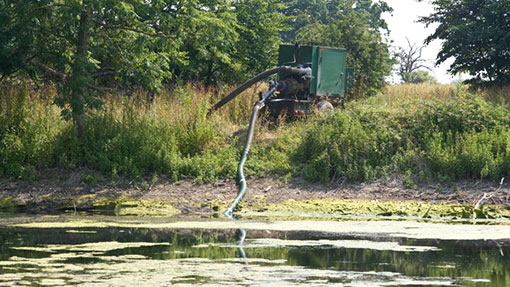Groundwater abstraction licences face review

Farmers are facing limits in the amount of water they can abstract next spring to prepare the country for strict requirements of the EU Water Framework Directive (WFD), Farmers Weekly can disclose.
With short notice, the Environment Agency has indicated that reductions in volume or restrictions could be imposed as early as March 2015 on farmers and landowners who are renewing time-limited water abstraction licences.
Licence holders in central Anglia are likely to be more affected than other regions in England because 400 time-limited licences are due to expire in the Cam & Ely Ouse catchment on 31 March 2015. It is understood that some 190 groundwater licences in the catchment could be affected by limits to water volume.
The proposals to limit volumes were discussed at a recent meeting in Newmarket, Cambridgeshire, between Environment Agency bosses, the NFU and farmers and landowners.
Andrew Blenkiron, manager of the 4,450ha Euston Estate, south of Thetford in Suffolk, attended the meeting. He said no details about the level of restrictions to water volume were revealed.
He added: “The feeling is that the Environment Agency is looking to meet some of the Water Framework Directive requirements now, especially for rivers that are under stress.
Short notice
“But farmers with time-limited abstraction licences that are up for renewal in March are really hacked off by the short notice.
“The Environment Agency is saying they are not going to remove these licences, but they are going to introduce some form of restrictions for next year.
“The problem is, we are all planning our cropping for next spring, but they have not given us an answer about how much they will restrict water volume by – 1%, 2%, 5% or 10%? Nobody knows.”
Mr Blenkiron, a Farmers Weekly Arable Farmer Focus writer, holds four water abstraction licences, of which two are up for renewal next March.
Read also: Water reform ‘threatens food security’
The estate’s 110m-gallon (500m-litre) reservoir and 40m gallon (182m litre) borehole are used to irrigate crops including carrots, parsnips, potatoes and onions, on the light land farm. Currently, Mr Blinkiron is also investing £500,000 in a new reservoir on farm.
“We abstract water through the winter to fill the reservoir. We are also groundwater abstractors through a borehole for the summer,” said Mr Blenkiron.
“In the short term, we should be able to cope with these restrictions. But with this EU diktat coming in, we are worried about the long-term effects.
“On what basis is all this being worked out? Is it right that agriculture loses out again?”
The Water Framework Directive aims to achieve a “good status” of groundwater by 2027 at the latest. But under the standards set down by the Directive, only 27% of water bodies in England are currently classified as “good”, according to Defra.
Groundwater supplies around one-third of our drinking water – and as much as 70% in London and the South East. As the population increases, water security will become a key issue.
In the long term, the government has said water abstraction systems will need to respond to pressures from climate change, including increased variability and reduced summer flows.
But while agriculture only accounts for about 1% of the total licensed water, farming organisations, including the NFU and CLA, have urged the government to ensure that farmers and land managers receive a fair allocation of water to meet the future challenges of food production and land management.
Paul Hammett, NFU water resources national spcialist, said: “The Environment Agency is looking at the WFD ‘no deterioration’ clause and checking whether the renewal of irrigation licences could cause a decline in water bodies.
“We understand the principal of no deterioration, but we are struggling to understand how a renewal of existing licences in similar terms to how they have previously been issued could cause any deterioration.”
The Environment Agency confirmed it was looking to limit abstraction licences to “deal with environmental uncertainty”.
An agency spokesman said: “We have established that some time-limited licences are unsustainable in our Catchment Abstraction Management Strategies (CAMS).
“In 2015 some of these licences will expire and we need to assess the environmental sustainability of them. If necessary, we may have to curtail some abstractions in line with the objectives for over-abstracted catchments.
“This approach is consistent with the need to deliver the statutory requirements of the European Water Framework Directive and place abstraction on a more sustainable footing prior to reform of the licensing system in the 2020s.”
He added: “The volume of reduction will vary from place to place and be different for individual abstractors. The Environment Agency will discuss the principles of how to make these reductions with national stakeholders.
“The agency is working hard to tell the farming community as soon as possible how their licences may or may not need to change. It will aim to advise all abstractors whose licences are expiring in March 2015 by the end of the summer.”
